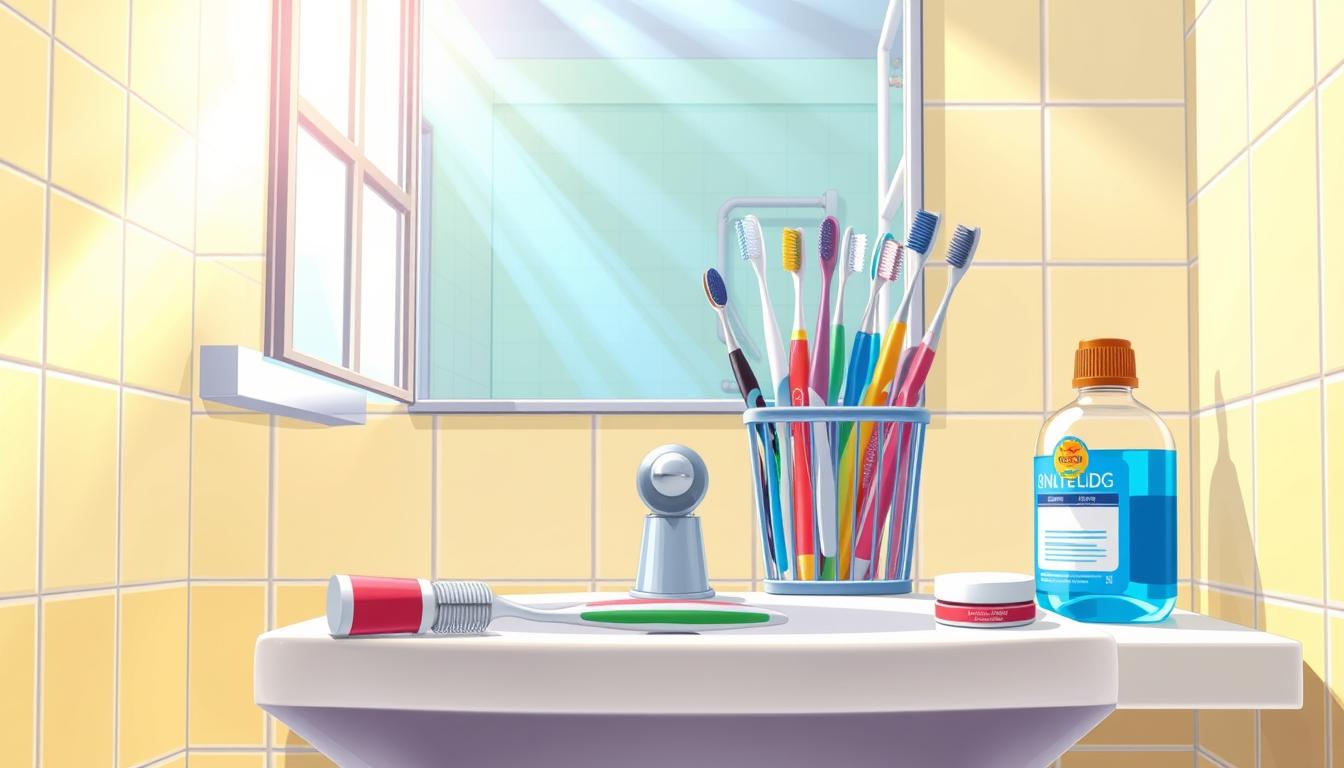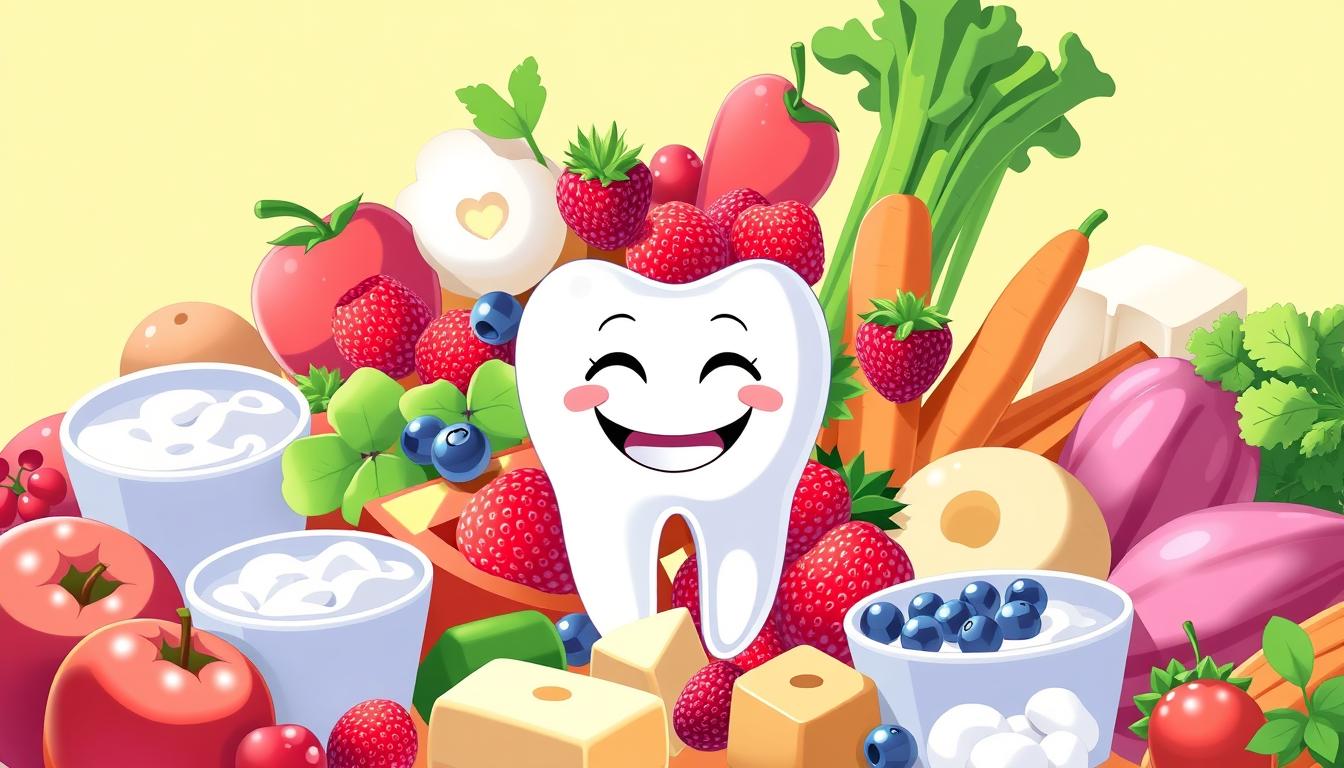Keeping your smile bright and healthy is key for your mouth and overall health. Yet, tooth decay is a common issue, affecting many people around the globe. It can cause pain, sensitivity, and unsightly cavities, affecting your life quality. Luckily, there are ways to stop tooth decay and keep your teeth strong and shiny.
This guide will cover the causes of tooth decay, its stages, and easy tips to protect your teeth. If you’re worried about tooth pain, sensitivity, or just want a healthier smile, this article has what you need. It’s your guide to a confident, healthy smile.

Key Takeaways
- Understand the underlying causes of tooth decay and its progressive stages
- Discover daily oral hygiene habits that can effectively prevent tooth decay
- Explore how diet and nutrition play a crucial role in maintaining dental health
- Learn the importance of regular professional dental care and preventive treatments
- Recognize lifestyle factors, such as smoking, that can contribute to tooth decay
Understanding Tooth Decay
Keeping your oral health and hygiene in check is key to a bright smile. Yet, many face the issue of tooth decay, a common dental problem. Understanding its causes and stages is vital to tackle it effectively.
Causes of Tooth Decay
Oral bacteria, eating too many sugary and starchy foods, and poor oral hygiene lead to tooth decay. These bacteria feed on sugars and carbs, making acids that harm our teeth’s enamel. This can cause cavities, or dental caries.
Stages of Tooth Decay
Tooth decay gets worse over time, following a clear pattern. It starts with demineralization of the enamel, showing up as small, white spots. If ignored, it can go deeper, hitting the dentin and then the pulp, causing pain and possibly needing dental decay treatment, like fillings or root canal therapy.
Knowing how tooth decay starts and progresses helps you fight it. Good oral care habits, like brushing and flossing regularly, and watching what you eat, can help prevent cavities. This keeps your smile healthy and bright.
Daily Oral Hygiene Habits
Keeping up with daily oral hygiene is key to stop tooth decay and keep your smile bright. Using the right brushing and flossing methods, along with fluoride-containing products, makes your teeth strong. It also keeps away dental cavities.
To make your dental care routine better, just follow these easy steps:
- Brush your teeth twice a day, for two minutes each time, with a soft toothbrush and toothpaste that has fluoride.
- Floss every day to get rid of plaque and food bits between your teeth, where your brush can’t go.
- Use an antimicrobial mouthwash to kill bacteria and lower your chance of dental sensitivity and instant pain relief for toothache.
- Think about using a fluoride mouth rinse or applying fluoride gel to make your tooth enamel stronger.
By focusing on these daily oral hygiene habits, you can keep your smile healthy. It will be like what a best dental clinic recommends for years ahead.
| Oral Hygiene Habit | Frequency | Benefit |
|---|---|---|
| Brushing | Twice daily | It removes plaque and food, helping to prevent dental care problems. |
| Flossing | Once daily | It cleans between teeth that brushing can’t, lowering the risk of dental pain relief. |
| Mouthwash | Once daily | It kills bacteria and helps stop dental care treatment issues. |
| Fluoride products | As needed | It makes tooth enamel stronger and helps with dental sensitivity treatment. |
Adding these simple daily oral hygiene habits to your routine helps you keep a healthy, best dental clinic-approved smile for a long time.

Diet and Nutrition for Healthy Teeth
The foods and drinks you eat are key to keeping your teeth healthy. To keep your teeth strong and pain-free, it’s vital to know how your diet affects your dental health.
Foods That Promote Dental Health
Some foods and nutrients can help protect your teeth and prevent decay. Here are some good choices for your diet:
- Fruits and vegetables: Crunchy fruits and veggies like apples, carrots, and celery clean your teeth and boost saliva production. This helps wash away food bits and neutralize acid.
- Dairy products: Milk, cheese, and yogurt are full of calcium and phosphorus. These minerals strengthen tooth enamel and fight cavities.
- Nuts and seeds: These snacks are packed with vitamins and minerals that support your oral health. They include vitamin C, vitamin E, and zinc.
Foods and Drinks to Limit
Some foods and drinks can harm your teeth and cause dental issues. It’s wise to eat less of these items to protect your teeth:
- Sugary treats: Foods like candies, cookies, and sweets feed the bad bacteria in your mouth. This leads to enamel erosion and cavities.
- Acidic drinks: Drinks like sodas, sports drinks, and citrus juices can weaken tooth enamel over time. This makes your teeth more likely to decay.
- Starchy foods: Foods like bread, pasta, and chips can get stuck in your teeth. This creates a place for bacteria that produce acids that harm your teeth.
By choosing wisely what you eat and drinking less of harmful items, you can protect your teeth from decay. This helps keep your smile healthy and pain-free.

Professional Dental Care
Seeing a dentist regularly is key to keeping your mouth healthy and stopping tooth decay. It’s important to go for routine dental check-ups. These visits help catch and fix problems early.
Routine Dental Check-ups
Your dentist will check your teeth, gums, and overall health during a routine check-up. They will do:
- Professional cleaning to remove plaque and tartar buildup
- Visual inspection for signs of tooth decay, gum disease, or other oral health issues
- X-rays to identify any hidden problems or structural abnormalities
- Discussions about your dental hygiene habits and areas for improvement
Preventive Treatments
Your dentist might suggest preventive treatments to keep your teeth strong and safe. These include:
- Fluoride applications – Fluoride helps make teeth stronger against acid attacks that can cause tooth decay.
- Dental sealants – These thin coatings on the back teeth help stop cavity formation.
- Athletic mouthguards – These custom-made devices protect your teeth when you’re active or playing sports.
| Preventive Treatment | Description | Benefits |
|---|---|---|
| Fluoride applications | Fluoride is applied directly to the teeth to strengthen the enamel and make it more resistant to acid attacks that can lead to tooth decay. | Helps prevent tooth decay and cavity formation. |
| Dental sealants | Thin, protective coatings are applied to the chewing surfaces of the back teeth, creating a barrier against food and plaque buildup. | Effectively prevent cavity formation in hard-to-reach areas of the teeth. |
| Athletic mouthguards | Custom-fitted devices that protect the teeth and mouth from injury during physical activities and sports. | Help avoid tooth decay and dental care treatment due to sports-related injuries. |
By going for regular dental check-ups and preventive treatments, you can take steps to protect your teeth from decay. This keeps your smile healthy and looking great.
How to Prevent Tooth Decay
Keeping your smile bright and healthy starts with stopping tooth decay. Tooth decay, or cavities, is a common issue that can get worse if ignored. Luckily, you can use several methods to prevent tooth decay, avoid tooth decay, and prevent cavity formation.
Practice Good Oral Hygiene
Good oral hygiene is key to preventing tooth decay. This means:
- Brushing your teeth twice a day with a fluoride toothpaste
- Flossing every day to clean between teeth
- Using mouthwash to kill bacteria
Maintain a Tooth-Friendly Diet
What you eat affects your teeth. Try to eat foods and drinks with less sugar and acid. These can harm your tooth enamel and cause cavities. Eat more:
- Fruits and veggies full of fiber and vitamins
- Dairy like milk and cheese for calcium and phosphate
- Whole grains and lean proteins
Seek Regular Dental Care
Seeing your dentist often helps prevent tooth decay. At these visits, your dentist can:
- Clean your teeth to remove plaque and tartar
- Check for and treat tooth decay early
- Recommend treatments like fluoride varnish or sealants
Address Lifestyle Factors
Some habits increase your risk of tooth decay. To avoid tooth decay, you should:
- Stop or cut down on smoking to boost your immune system
- Manage health conditions like diabetes that affect your mouth
- Drink less sugary and acidic foods and drinks
Using these steps, you can stop tooth decay and keep your smile healthy and bright for a long time.

| Tips for Preventing Tooth Decay | Benefits |
|---|---|
| Practice good oral hygiene | Removes plaque and prevents bacteria buildup |
| Consume a tooth-friendly diet | Provides nutrients for strong teeth and reduces acid/sugar exposure |
| Seek regular dental care | Allows for early detection and treatment of dental issues |
| Address lifestyle factors | Reduces risk factors that contribute to tooth decay |
Lifestyle Factors Affecting Dental Health
Good dental health is more than just brushing and flossing. Lifestyle habits and factors can greatly affect your risk of tooth pain, tooth sensitivity, and tooth decay. Smoking is one such factor that’s important to watch out for.
Smoking and Tooth Decay
Studies have found a strong link between smoking and more tooth and gum pain. Smokers are also more likely to get tooth decay and other oral health problems. They often have sensitive teeth and need more treatments for tooth decay and treatment for a cavity.
Cigarette smoke contains harmful chemicals that can hurt the gums and tooth enamel. This makes teeth more likely to have tooth pain relief and sensitive teeth treatment. Smoking also slows down healing, making it harder for the mouth to recover from tooth and gum pain or sensitive teeth cure.
To keep your teeth healthy and avoid tooth pain and tooth sensitivity, quitting smoking is key. If you can’t quit, don’t start. Getting help from health experts can make a big difference in your sensitive teeth treatment and pain relief for tooth pain.
“Smoking is one of the leading risk factors for the development of tooth decay and other oral health problems. Quitting smoking can significantly improve your chances of maintaining a healthy, pain-free smile.”
Conclusion
To prevent tooth decay, you need to do several things. This includes daily brushing, eating well, seeing your dentist often, and living a healthy lifestyle. By following the advice in this article, you can keep your smile bright and avoid dental problems.
Brushing and flossing right, eating less sugar, and seeing your dentist regularly are key. Not smoking and staying healthy also helps keep your teeth and gums strong.
Stopping tooth decay is about being careful and getting help when you need it. Putting your oral health first can save you from pain and let you smile with confidence. Start using these tips to take care of your teeth now.
FAQ
Tooth decay comes from bacteria in the mouth, eating too much sugar, and not brushing well. These things make plaque, which eats away at tooth enamel and causes cavities.
Tooth decay goes through stages. First, it weakens the enamel. Then, it forms a small cavity. If not treated, it can grow bigger, reach the tooth’s core, cause pain, and lead to infection.
Good daily habits for preventing tooth decay include brushing twice a day with fluoride toothpaste. Flossing every day to clean between teeth helps too. Using mouthwash can also kill harmful bacteria.
Eating fruits, veggies, dairy, and drinking water helps dental health. These foods and drinks have nutrients that strengthen tooth enamel and lower decay risk.
Limit foods and drinks with lots of sugar and acid, like soda and candy. They can wear away enamel and cause cavities.
See the dentist every six months for check-ups and cleanings. This helps catch problems early and keeps teeth strong against decay.
Fluoride treatments, dental sealants, and regular cleanings help prevent decay. They make enamel stronger and protect against cavities.
Smoking raises your risk of tooth decay. It weakens your immune system, lowers saliva flow, and lets harmful bacteria grow. Quitting smoking can greatly improve your oral health and lower cavity risk.
